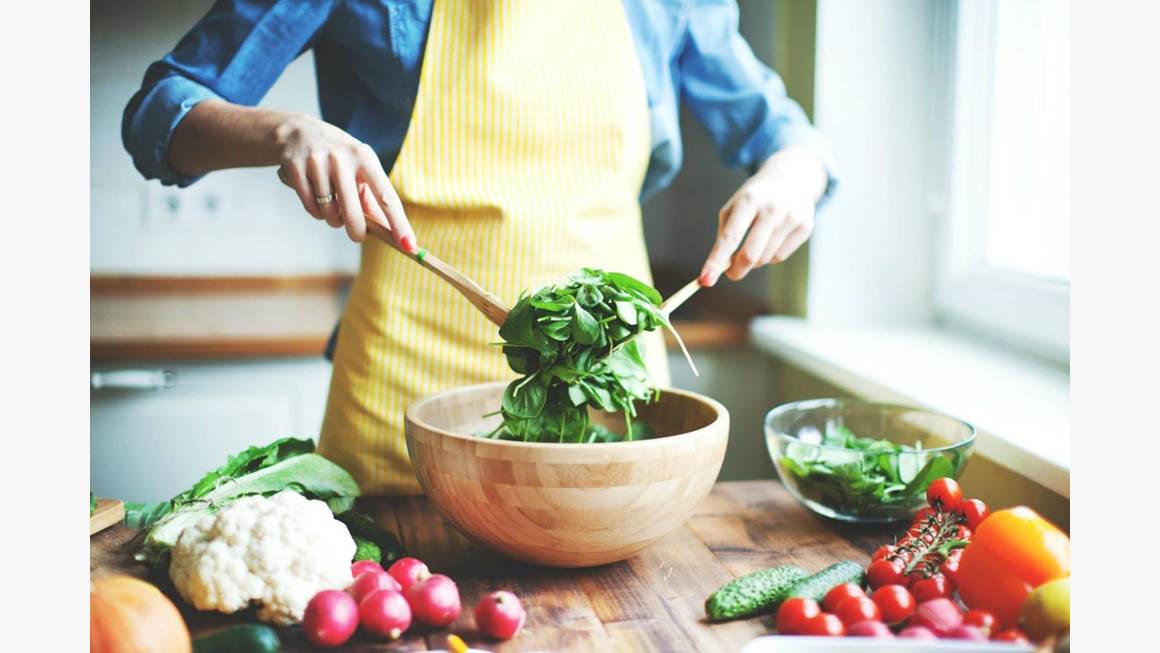A salad can be much more than a simple appetizer of iceberg lettuce and cucumber. With the right ingredients, including vegetables, grains, protein and healthy fat, you can enjoy salad as your main meal — a healthy lunch or dinner filled with sun-kissed local produce.
Making it a meal
A salad composed of vegetables makes a great appetizer. But while vegetables are chock-full of vitamins, minerals and heart-healthy antioxidants, they are notoriously low in calories – about 25 calories per cup. That’s not enough energy to fuel you until your next meal. Top up your salad’s nutritional power by following these three simple steps:
- Start with fibre-filled vegetables and grains
- Add your protein
- Finish with healthy fats.
Start with a base
Carbs get a bad rap because most people associate them with white flour and sugar. But did you know that every single vegetable is also rich in carbohydrates? The good carbs listed below provide you with energy, fibre, vitamins and minerals – and they serve as excellent salad bases:
- leafy greens such as romaine, arugula, kale and spinach
- whole grains such as quinoa, brown rice and bulgur
- chopped or shredded vegetables such as cucumber, tomato, cabbage, and beets.
Top any of these choices with an array of vegetables and fruit. If you’re bored with the usual, try different prep methods. For example, add roasted broccoli, green beans or cauliflower, or use a vegetable peeler to create ribbons of zucchini, cucumber or carrot. Toss in blueberries, orange segments or strawberries – all pair well with balsamic vinaigrettes.
Add your protein
Adding protein and fat to the salad helps your body digest the carbohydrates more slowly and give you a steady stream of energy. Protein also provides a feeling of fullness that you won’t get from vegetables alone. Add one or more of these protein-rich foods to your salad:
- lean meat: chicken or turkey breast, lean steak
- lower-fat cheese: light cheddar, Swiss, mozzarella, feta, goat cheese
- legumes: kidney beans, lentils, chickpeas, white or black beans
- eggs: hard boiled
- soy products: cubed tofu, edamame
- fish and seafood: tuna, salmon, shrimp, sardines.
Finish with healthy fats
Like carbs, some fats are better than others. For heart health, replace foods with saturated or trans fat (bacon bits, crunchy fried noodles, cream-based dressing) with these options, which contain heart-healthy fats:
- salad dressing made from olive oil
- avocado
- nuts: almonds, walnuts, cashews, pecans
- seeds: pumpkin, sunflower, flax, sesame.
Remember that high-fat foods are also loaded with calories, so add these toppings sparingly. Use 1-2 tablespoons (15-250 mL) of dressing, and no more than a ¼ cup (50 mL) of nuts or seeds. Bonus: Adding healthy fat to your salad helps your body absorb the vitamins and antioxidants found in the vegetables!
Be creative with your own ingredients, or be inspired by our recipes, including Grilled steak and vegetable salad, Salmon arugula salad and Quinoa,black bean and mango salad
All are great dinner options – and the leftovers make a perfect toteable lunch.
-
Browse all our heart-healthy recipes.
